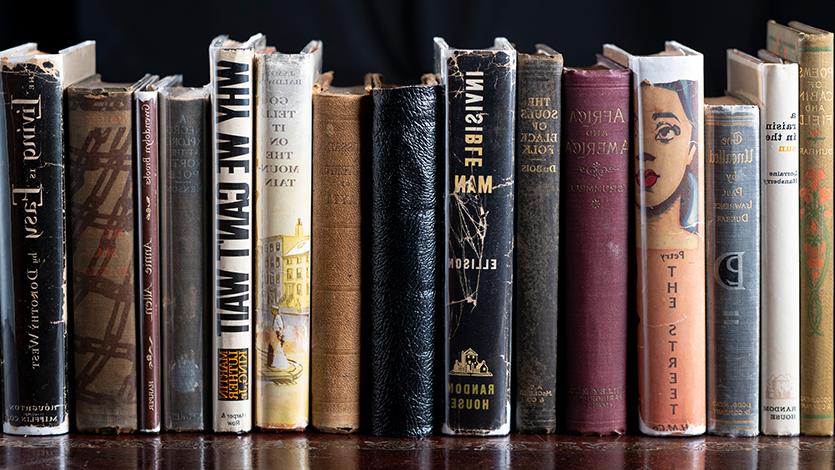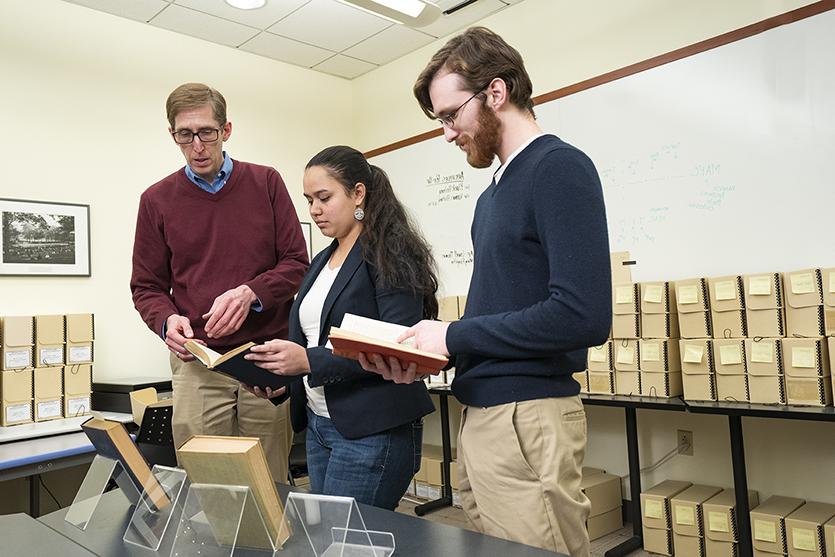Rare Book Collection Shines a Light on the African-American Experience

The collection of Alvin Patrick ’86 includes first-edition books by Martin Luther King, Jr., Frederick Douglass, W.E.B. DuBois, James Baldwin, Ralph Ellison, Toni Morrison, and many others.
January 25, 2019—Alvin Patrick ’86 did not consciously set out to assemble an extraordinary collection of books by African-American authors, but that’s exactly what happened. A veteran of broadcast and cable television, Patrick is a Senior Producer for CBS, where he produces high profile stories with CBS News Special Correspondent James Brown for 60 Minutes, the CBS Evening News, Sunday Morning, CBS This Morning, and 48 Hours. As he tells it, “I love reading, so I’ve been collecting books on many subjects forever. But I suppose that this collection began in earnest when I purchased The Norton Anthology of African-American Literature in 1996. From there, I focused on obtaining some of the classics mentioned in that anthology.” His rare book collection grew larger, eventually touching on nearly every aspect of the black experience in America, and it occupied a special shelf in his home library in Connecticut.
It occurred to Patrick that others (especially students) would enjoy these books as much as he did, so he contacted Marist, where he studied communication and currently serves on the Board of Trustees, about organizing an exhibition. Director of Archives and Special Collections John Ansley readily agreed, and from February 8 through March 31, members of the Marist community and the public will have the opportunity to view Patrick’s collection firsthand in an exhibit entitled “Black Lit: The African American Narrative.” Ansley is being ably assisted in his curation of the exhibition by Sage Kawelo ’19, a history major from Waianae, Hawaii, and Andrew Zink ’19, a history and political science double major from Pine Bush, New York.
Patrick’s rare, first edition book collection features culturally perceptive novels, historically significant biographies, iconic poetry, and famously critical essays from some of the most prominent black authors of our time. The collection of black literature spans mid-19th century slave narratives, the artistic heights of the Harlem Renaissance, and 21st century essays on racism in the United States. Each book is astounding in both its timelessness and striking modern relevance. Several are inscribed by their authors.

Alvin Patrick; some volumes from his collection
The names and works represented in the collection comprise a veritable who’s who of prominent African-Americans. Their many accomplishments are all the more inspiring because they were achieved despite the harsh realities of slavery, racism, discrimination, and violence: My Bondage and My Freedom by Frederick Douglass, Up From Slavery by Booker T. Washington, Souls of Black Folk by W.E.B. DuBois, Native Son by Richard Wright, Invisible Man by Ralph Ellison, Go Tell It On The Mountain by James Baldwin, Why We Can’t Wait by Martin Luther King, Jr., The Autobiography of Malcolm X, and Beloved by Toni Morrison, among others.
Famous or not, each book represents a valuable piece of history, and Patrick is extremely well versed in the details. Says Patrick, “I didn’t learn this stuff in school, but I’m a history buff, and as a journalist I’m naturally curious.” There are books in the collection by the first African-American to earn a degree from Cambridge University in England (Alexander Crummell), the first African-American to win a Pulitzer Prize (Gwendolyn Brooks), the first African-American woman to have a play staged on Broadway (Lorraine Hansberry), the only African-American to win a Nobel Prize in Economics (W. Arthur Lewis), and the first African-American woman to have a novel sell a million copies (Ann Petry).
According to Patrick, Toussaint L’Ouverture: Biography and Autobiography (1863) is his favorite book in the collection because not many people understand his unique role in history. “His slave revolt in Haiti led directly to the Louisiana Purchase. Napoleon couldn’t defeat it, so he needed money, which the U.S. provided by buying all that land. Toussaint L’Ouverture was such a mythical figure, and this book is the first English printing of his memoir, which was written in a French prison.”

L-R: Andrew Zink '19, Sage Kawelo '19, John Ansley
For Ansley, to have Patrick’s rare book collection on display is a unique chance to highlight the black experience for Marist students and the general public because it tells the black narrative in a very interesting way. He is also enthusiastic about getting students involved in preparing the exhibit: “I think Marist does a particularly good job at giving students unique experiences that undergraduates don’t typically get to do. Most students working in an archive only get to work on the less creative side of things, like scanning, but Sage and Andrew are doing research, writing descriptive text, and preparing the display.” Says Zink, “This collection really shows the evolution of black culture. These books are critical pieces of American history, and the public should know that they are important.”
Kawelo, who has previously worked with Ansley on Marist’s photo collection and a film project about Lowell Thomas, has read many of the books in Patrick’s collection and is thrilled to be involved. She notes, “Many of the authors were pioneers in talking about America’s struggles with race. Many knew each other and actively engaged with one another intellectually, so I’m trying to show that context.” Both students hope that the exhibit attracts many visitors. Says Kawelo, “I hope that students from the Black Student Union attend so that can see their history represented and feel proud.” Zink thinks it is important for all Marist students to attend. He points out, “It’s an opportunity to see rare books you’ll probably never get the chance to see again. The collection also shows what African-Americans were able to accomplish at a time when pseudoscientific racism said that they were inferior.” For both Kawelo and Zink, working on the exhibit has been extremely exciting. It is also valuable preparation for their future careers in museums and public history.

My Bondage and My Freedom (1855) by Frederick Douglass
The public will be in for a special treat on February 13, when Patrick and Lisa Lucas, Executive Director of the National Book Foundation, will be on campus for a reception celebrating the rare books collection. Lucas is the first woman and first African-American to lead the Foundation. They met when Patrick did a story on Lucas for CBS This Morning, and he asked her to visit Marist to speak about his collection’s historical significance, the importance of the written word, and her work overseeing the organization that bestows the National Book Award. For his part, Patrick hopes turnout at the reception and the two-month exhibit is strong. “I hope all Marist students attend, especially those who haven’t been exposed to the African-American literary canon. Everyone should be interested in Native Son, Invisible Man, Up From Slavery, and all the rest. It’s not just black history; it’s the history of our nation.”
“Black Lit: The African-American Narrative” runs from February 8 – March 31 in the James A. Cannavino Library. On Wednesday, February 13 at 4 p.m., there is a special reception highlighting the rare book collection. The reception is followed by a presentation featuring Lisa Lucas, Executive Director of the National Book Foundation. Kindly RSVP by February 8 online at http://maristconnect.sanmingzhi.net/blacklit.



